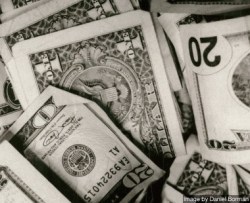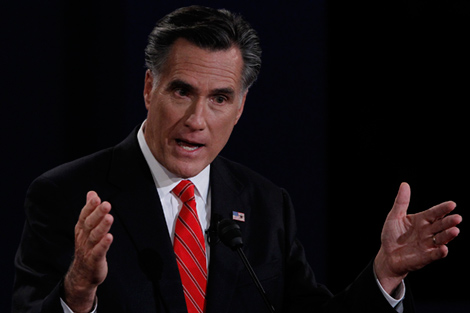
Daniel BormanThe kind of green Romney would never lie about.
It is a little-known fact that Mitt Romney made his fortune by selling false statements on the black market. He’s got a guy he knows in the Caymans who will buy fibs for $5,000 and straight lies for $10,000. As he’s giving interviews or speaking at rallies, a staff member records what he says, wringing out the stray pieces of wheat and packing up the chaff for shipment to the Caribbean.
What I’m saying is that Mitt Romney has a casual association with factual accuracy.
Last night, he made a lot of money from his Caymans contact, pulling in the highest dollar amount for this little bit right here:
You put $90 billion into — into green jobs. And — and I — look, I’m all in favor of green energy. Ninety billion [dollars] — that — that would have — that would have hired 2 million teachers. Ninety billion dollars. And these businesses — many of them have gone out of business. I think about half of them, of the ones have been invested in, they’ve gone out of business. A number of them happened to be owned by — by people who were contributors to your campaigns.
For this little number, Romney earned about $90 billion. Because it is wrong. Very, very wrong. Others have made this point — ThinkProgress and Wonkblog — but it’s worth spelling out how far from the truth Romney was.
The claim:
$90 billion of stimulus money was invested in green companies, half of which went out of business. “A number of them” were owned by contributors to Obama’s campaigns.
The truth:
From the New York Times:
That is a gross overstatement. Of nearly three dozen recipients of loans under the Department of Energy’s loan guarantee program, only three are currently in bankruptcy, although several others are facing financial difficulties.
But that loan-guarantee program doesn’t constitute $90 billion. Romney’s campaign only clarified this morning that he was referring just to that loan program — which only consists of about $16 billion. Of $90 billion in investments in green projects — money that went to energy efficiency and high-speed rail and a number of other things — the amount that’s gone to failed projects is less than 2 percent.
Then there are those donors. Setting aside the fact that 550,000 people gave $200 or more to Obama in 2008, is the president handing out money to cronies? Again, the Times:
Mr. Romney also said that many of the companies that received such loans were supported by campaign contributors. George Kaiser, a major fund-raiser for Mr. Obama’s 2008 campaign, was an investor in Solyndra, the failed solar panel maker, but there are also examples of Republican and Democratic campaign contributors who invested in companies supported by the loan guarantee program.
So … no.
Oh, also Mitt Romney strongly advocated government investment in green tech when he was governor of Massachusetts in 2004. That seems pertinent, since Romney’s entire argument was that Obama was misguided.
Obama wasn’t — but it was hard for a viewer to determine that. In theory, presidential debates give the candidates a chance to present differing options for addressing the country’s problems. It’s important, then, that candidates are honest and deliberate in presenting their policies.
Kidding! Say what you have to say to get elected. Better strategy. And if you can make a few bones from your mystical island lie-procurer by doing so, go for it. That’s just how America works.




